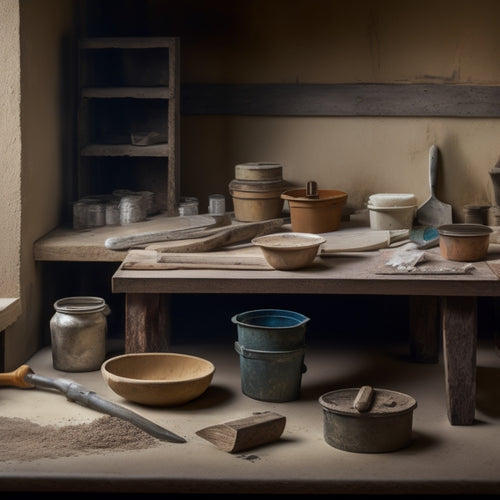
Why Choose These Top Basement Renovation Materials
Share
When choosing basement renovation materials, you want options that will stand the test of time and enhance your space's functionality, comfort, and style. Durable and resilient materials like luxury vinyl tile, porcelain tile, and commercial-grade carpeting guarantee high-traffic areas remain pristine. Moisture-resistant flooring and walls prevent water damage, while cost-effective options like LVT and ceramic tiles offer quality without breaking the bank. You'll also want to reflect on comfort and warmth underfoot, low-maintenance and easy cleaning, stylish design options, sustainable and eco-friendly choices, and soundproofing solutions. As you explore these top basement renovation materials, you'll discover the perfect fit for your unique needs and goals.
Key Takeaways
• Durable materials like LVT, porcelain tile, and commercial-grade carpeting ensure high traffic areas withstand wear and tear.
• Water-resistant materials and drainage solutions protect flooring from water damage and warping, maintaining a dry and stable environment.
• Cost-effective options like LVT, engineered hardwood, and ceramic tiles provide quality without breaking the bank, considering total cost of ownership.
• Comfort-enhancing materials like insulating underlayment, radiant heating systems, and warm flooring choices improve ambiance and livability in basement spaces.
• Low-maintenance materials such as LVT, porcelain tile, and engineered hardwood with polyurethane finish minimize upkeep and cleaning efforts.
Durable Options for High Traffic
When renovating your basement, you'll want to choose flooring and wall materials that can withstand heavy foot traffic and frequent use, especially in areas like home gyms, playrooms, or home theaters.
For high-traffic zones, it's crucial to prioritize durability and resilience in your material selection. Look for options that boast exceptional wear resistance, ensuring that your flooring and walls can handle the constant flow of people and activities. Impact resistance is another critical factor, as it will help protect your surfaces from damage caused by dropped weights, fallen objects, or other accidents.
Some excellent durable options for high-traffic areas include luxury vinyl tile (LVT), porcelain tile, and commercial-grade carpeting. LVT and porcelain tile are both highly resistant to scratches, dents, and fading, making them ideal for busy spaces.
Commercial-grade carpeting, on the other hand, is designed to withstand heavy foot traffic and can be easily cleaned and maintained. By choosing materials that can keep up with your active lifestyle, you'll be able to enjoy your basement renovation for years to come without worrying about excessive wear and tear.
Moisture-Resistant Flooring Solutions
Since basements are naturally prone to moisture, you'll want to prioritize flooring materials that can resist water damage, warping, and staining, ensuring your renovation remains safe and aesthetically pleasing for years to come.
To achieve this, consider installing moisture-resistant flooring solutions that incorporate advanced technology and materials. One effective approach is to use a combination of moisture barriers and drainage solutions. These systems work together to redirect water away from the flooring material, preventing damage and ensuring a dry, stable environment.
For example, you can install a waterproof underlayment material, such as a polyethylene or PVC sheet, beneath your flooring material. This creates a barrier that prevents moisture from seeping up into the flooring.
Additionally, consider incorporating drainage solutions, such as a French drain system, to direct water away from the foundation of your home.
Best Value for Budget-Conscious
If you're working with a limited budget, you'll want to focus on finding cost-effective flooring options that still offer excellent performance and durability in a basement environment. You don't have to sacrifice quality to stay within your budget. Instead, explore affordable alternatives that fit your needs.
| Flooring Option | Cost per Square Foot |
|---|---|
| Luxury Vinyl Tiles (LVT) | $0.50 - $2.00 |
| Engineered Hardwood | $1.00 - $3.00 |
| Ceramic or Porcelain Tiles | $1.50 - $4.00 |
| Peel-and-Stick Tiles | $0.25 - $1.00 |
When budget planning, consider the total cost of ownership, including installation, maintenance, and replacement costs. LVT, for instance, is an affordable option that requires minimal maintenance and can last up to 20 years. Engineered hardwood, on the other hand, may be more expensive upfront but can last for decades with proper care. By weighing the pros and cons of each option, you can find the perfect balance of quality and affordability for your basement renovation.
Comfortable and Warm Underfoot
You'll want to contemplate flooring options that prioritize comfort and warmth underfoot, as this can greatly impact the overall ambiance and livability of your basement space.
A cold, hard floor can quickly make your basement feel unwelcoming, but the right materials can create a cozy retreat.
Consider installing an insulating underlayment, such as foam or cork, beneath your flooring to reduce heat loss and dampen sound. This is especially important in basements, where cold concrete slabs can radiate chilliness.
For an added layer of warmth, you might opt for radiant heating, which involves installing heating elements, like electric mats or hydronic pipes, beneath your flooring. This can be especially luxurious under tile or stone floors, which can feel cold to the touch.
With radiant heating, you can enjoy warm, toasty floors even on the chilliest of days.
Low Maintenance and Easy Cleaning
When selecting basement renovation materials, choose flooring options that not only prioritize comfort and warmth but also offer low maintenance and easy cleaning to confirm your space remains a haven for years to come.
You want to ascertain that your basement remains a comfortable and inviting space without requiring a lot of upkeep.
To achieve this, consider the following surface materials that will reduce your cleaning frequency and make maintenance a breeze:
-
Water-resistant laminate flooring: This option is perfect for basements prone to moisture, as it's easy to clean and resistant to water damage.
-
Porcelain or ceramic tiles: These tiles are non-porous, making them easy to clean and resistant to stains.
-
Luxury vinyl tiles (LVT): LVT is a low-maintenance option that's resistant to scratches and easy to clean.
- Engineered hardwood flooring with a polyurethane finish: This option is durable and easy to clean, with a finish that resists scratches and fading.
Stylish and Versatile Design Options
When it comes to basement renovation materials, you're not limited to drab, outdated designs.
You can choose from a wide range of modern aesthetic choices that reflect your personal style and complement your home's décor.
With durable finishing options, you can create a space that's both beautiful and long-lasting.
Modern Aesthetic Choices
Modern basement renovations often feature sleek, industrial-chic exposed ductwork and concrete floors that become a design focal point, rather than an eyesore. You're no longer limited to bland, cookie-cutter designs. Today, you can choose from a wide range of modern aesthetic choices that reflect your personal style.
If you're drawn to minimalist design, you'll love the clean lines and simplicity of industrial aesthetics. You can incorporate industrial elements, such as:
- Exposed brick or concrete walls
- Metal beams and columns
- Polished concrete floors
- Industrial-style lighting fixtures
These modern aesthetic choices offer endless possibilities for creative expression. By embracing industrial chic, you can create a unique and stylish space that's perfect for relaxing, entertaining, or pursuing your hobbies.
With the right materials and design elements, your basement can become a stunning reflection of your personal taste and style.
Durable Finishing Options
How can you guarantee that your basement renovation stands the test of time while still reflecting your personal style? The answer lies in choosing durable finishing options that not only withstand the test of time but also elevate your basement's aesthetic appeal.
When it comes to basement ceiling options, consider opting for drop ceilings or suspended ceilings, which aren't only durable but also provide easy access to pipes and ductwork. Additionally, these ceilings can be finished with a variety of materials, such as drywall, plaster, or even acoustic panels, to create a unique look.
For finishing texture choices, you can opt for a variety of materials that offer both durability and style. Consider using textured paints or specialized coatings that provide a unique finish while also being resistant to moisture and wear.
Alternatively, you can choose from a range of flooring options, such as ceramic tiles, hardwood, or laminate, which offer durability and versatility. By selecting the right durable finishing options, you can create a basement space that's both functional and stylish, and that will continue to impress for years to come.
Sustainable and Eco-Friendly Choices
As you plan your basement renovation, you're likely thinking about the environmental impact of your material choices.
You'll want to contemplate sustainable options that not only benefit the planet but also enhance your basement's aesthetic and functionality.
From eco-friendly flooring to reclaimed wood and low-VOC paint, you'll find a range of choices that align with your values and design goals.
Eco-Friendly Flooring Options
When it comes to choosing eco-friendly flooring options for your basement renovation, you'll want to contemplate materials that not only reduce your carbon footprint but also provide durability and aesthetic appeal.
As you explore sustainable options, consider the following eco-friendly flooring choices:
-
Bamboo Flooring: Bamboo is a highly renewable resource that's resistant to moisture, making it an excellent choice for basements. It's also durable and can withstand heavy foot traffic.
-
Cork Tiles: Cork is a natural, sustainable material that's soft underfoot and provides excellent insulation. It's also resistant to moisture and humidity, making it perfect for basements.
-
Recycled Glass Tiles: Made from recycled glass, these tiles are an eco-friendly alternative to traditional ceramic or porcelain tiles. They're durable, easy to clean, and come in a variety of colors.
- Linoleum Flooring: Linoleum is made from natural materials like linseed oil, wood flour, and cork dust. It's durable, easy to maintain, and comes in a range of colors and patterns.
These eco-friendly flooring options not only reduce your environmental impact but also provide a unique aesthetic appeal to your basement renovation.
Reclaimed Wood Benefits
You can further emphasize your commitment to sustainability by incorporating reclaimed wood into your basement renovation, which not only reduces waste but also adds a unique touch to your space. By choosing reclaimed wood, you're reusing materials that would otherwise end up in landfills, greatly reducing the environmental impact of your renovation. This eco-friendly choice also supports sustainable forestry practices, as it reduces the demand for new lumber.
Reclaimed wood aesthetics are unparalleled, with each piece telling a story of its past life. The unique textures, colors, and patterns created by the wood's history add character and depth to your basement renovation.
You can use reclaimed wood for accent walls, ceiling panels, or even furniture, creating a one-of-a-kind space that reflects your commitment to sustainability. Additionally, reclaimed wood is often more durable and resistant to warping than new wood, making it a practical choice for high-traffic areas like basements.
Low-VOC Paint Choices
Selecting low-VOC (volatile organic compound) paint for your basement renovation guarantees a healthier indoor environment, reduces air pollution, and contributes to a more sustainable space. You'll breathe easier knowing you've chosen a paint that emits fewer harmful chemicals.
When shopping for low-VOC paint, look for products labeled accordingly, and opt for water-based paints over oil-based ones.
Here are some additional tips to take into account:
-
Always read the label: Check the VOC level, and choose paints with levels below 200 grams per liter.
-
Think about the color: Dark colors tend to have higher VOC levels than lighter shades, so keep this in mind during your color selection process.
-
Prep is key: Confirm your basement walls are clean, dry, and free of dust to ensure a smooth paint application.
- Application matters: Use paint application techniques like rolling or brushing to minimize VOC emissions.
Soundproofing and Noise Reduction
To effectively soundproof your basement, it's essential to understand the importance of reducing noise transmission through walls, floors, and ceilings, as well as the various materials and techniques used to achieve the best noise reduction.
You'll want to take into account the type of noise you're trying to block, whether it's airborne (voices, music) or impact-based (footsteps, appliances).
For airborne noise, acoustic panels can be highly effective. These panels absorb sound waves, reducing reverberation and echo. You can place them on walls, ceilings, or even stand them upright on the floor.
Sound barriers, on the other hand, are designed to block noise transmission through physical barriers. These can include mass-loaded vinyl, acoustic caulk, or even DIY solutions like adding a second layer of drywall.
When selecting soundproofing materials, look for products with high sound transmission class (STC) ratings or noise reduction coefficient (NRC) values.
Long-Lasting and Resilient Materials
When building your dream basement, durable materials that can withstand moisture, humidity, and heavy foot traffic are essential to creating a long-lasting and resilient space. You want to make sure that your basement renovation stands the test of time, and choosing the right materials is vital to achieving long-term performance.
Here are some top materials that excel in durability and resilience:
-
Water-resistant flooring: Options like ceramic tile, porcelain, and luxury vinyl tile (LVT) can withstand moisture and humidity, making them perfect for basements prone to water damage.
-
Mold-resistant drywall: Specialized drywall products with mold-resistant coatings can help prevent the growth of mold and mildew, making for a healthier indoor environment.
-
Durable paint finishes: High-quality, low-VOC (volatile organic compound) paints with moisture-resistant properties can withstand the humid conditions found in basements.
- Sturdy trim and molding: Using durable materials like PVC or composite trim and molding can resist warping, cracking, and rotting, making for a beautiful finish that lasts.
Frequently Asked Questions
Can I DIY a Basement Renovation or Do I Need a Pro?
When tackling a basement renovation, you're probably wondering if you can DIY or need a pro.
While you might be capable of handling small tasks, complex projects require essential tools and expertise.
If you're looking for cost-effective solutions, consider hiring a professional who can guarantee a high-quality finish and avoid costly mistakes.
They'll have the necessary skills and equipment to get the job done efficiently and correctly.
How Do I Determine My Basement's Specific Renovation Needs?
You're taking the first step towards a successful basement renovation by determining your space's specific needs.
Start by conducting a thorough basement inspection, using a checklist to identify areas that require attention, such as water damage, structural issues, or outdated electrical systems.
This will help you create a realistic renovation budget plan, prioritizing must-haves and nice-to-haves.
Will a Renovation Increase My Home's Resale Value?
You're probably thinking, 'Will I just be throwing money down the drain, or will a renovation actually boost my home's resale value?'
The good news is that a well-planned renovation can recoup up to 70% of the renovation costs when you sell.
In fact, a finished basement can increase your home's resale value by 10-15%.
Can I Finance a Basement Renovation Through My Mortgage?
You're wondering if you can finance a basement renovation through your mortgage.
The answer is yes! You can tap into your home's equity or explore government-backed mortgage options, like FHA 203(k) loans or VA cash-out refinance loans.
When researching financing tips, consider factors like interest rates, repayment terms, and fees.
Weigh your options carefully to find the best fit for your renovation goals and budget.
How Long Does a Typical Basement Renovation Project Take?
As you immerse yourself in your basement renovation project, you're likely wondering how long it'll take to transform the space.
Typically, a basement renovation project can take anywhere from 3-6 months, depending on the scope and complexity.
To stay on track, create a detailed basement renovation timeline and prioritize project management tips like setting realistic milestones and allocating tasks efficiently.
Conclusion
As you stand in your newly renovated basement, surrounded by the perfect blend of form and function, you'll realize that the right materials have transformed the space into a haven.
Like a masterpiece of art, each element harmoniously blends together, creating a symphony of comfort, style, and durability.
Your dream basement has finally come to life, and with these high-quality materials, it will continue to thrive for years to come, a true reflection of your impeccable taste and dedication to excellence.
Related Posts
-

Crack Repair Inspection Checklist for Home Renovation
When creating a crack repair inspection checklist for your home renovation project, you'll want to identify crack typ...
-

Top 5 Plastering Tools for Small Renovation Jobs
For small renovation jobs, you'll want to start with the top 5 crucial plastering tools: a putty knife for applying a...
-

3 Best Planter Shopping Timeline Tips for Renovators
When incorporating planters into your renovation project, you'll want to plan carefully to avoid delays and guarantee...


